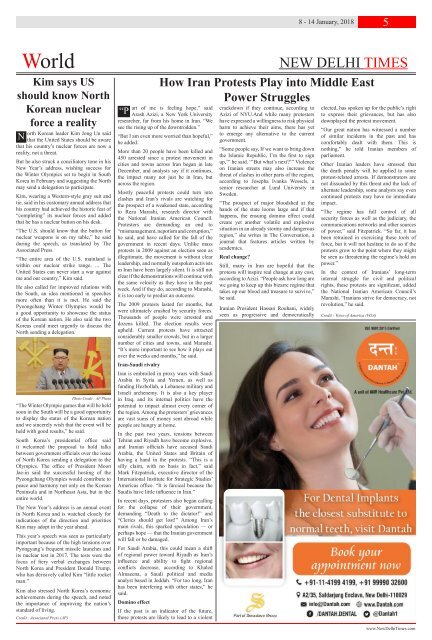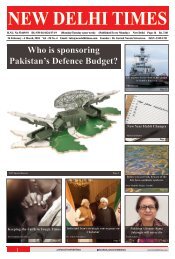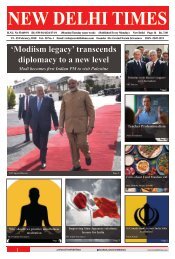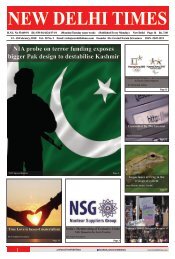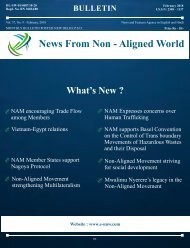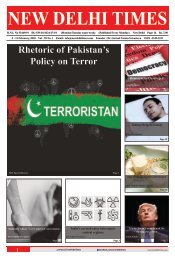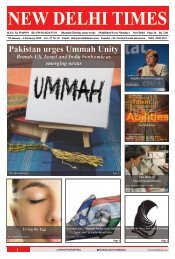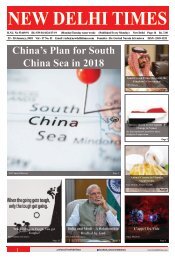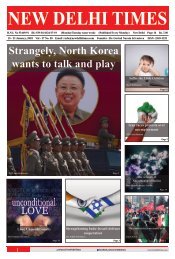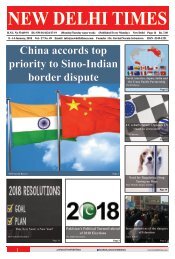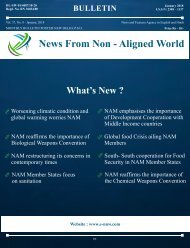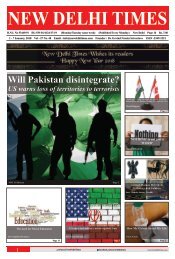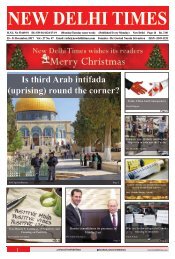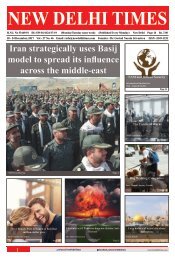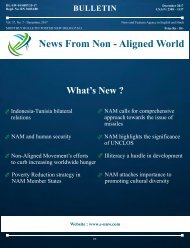8-14 January 2018 - 16-min
You also want an ePaper? Increase the reach of your titles
YUMPU automatically turns print PDFs into web optimized ePapers that Google loves.
8 - <strong>14</strong> <strong>January</strong>, <strong>2018</strong> 5<br />
World<br />
Kim says US<br />
should know North<br />
Korean nuclear<br />
N<br />
force a reality<br />
orth Korean leader Kim Jong Un said<br />
that the United States should be aware<br />
that his country’s nuclear forces are now a<br />
reality, not a threat.<br />
But he also struck a conciliatory tone in his<br />
New Year’s address, wishing success for<br />
the Winter Olympics set to begin in South<br />
Korea in February and suggesting the North<br />
may send a delegation to participate.<br />
Kim, wearing a Western-style gray suit and<br />
tie, said in his customary annual address that<br />
his country had achieved the historic feat of<br />
“completing” its nuclear forces and added<br />
that he has a nuclear button on his desk.<br />
“The U.S. should know that the button for<br />
nuclear weapons is on my table,” he said<br />
during the speech, as translated by The<br />
Associated Press.<br />
“The entire area of the U.S. mainland is<br />
within our nuclear strike range. ... The<br />
United States can never start a war against<br />
me and our country,” Kim said.<br />
He also called for improved relations with<br />
the South, an idea mentioned in speeches<br />
more often than it is met. He said the<br />
Pyeongchang Winter Olympics would be<br />
a good opportunity to showcase the status<br />
of the Korean nation. He also said the two<br />
Koreas could meet urgently to discuss the<br />
North sending a delegation.<br />
“The Winter Olympic games that will be held<br />
soon in the South will be a good opportunity<br />
to display the status of the Korean nation<br />
and we sincerely wish that the event will be<br />
held with good results,” he said.<br />
South Korea’s presidential office said<br />
it welcomed the proposal to hold talks<br />
between government officials over the issue<br />
of North Korea sending a delegation to the<br />
Olympics. The office of President Moon<br />
Jae-in said the successful hosting of the<br />
Pyeongchang Olympics would contribute to<br />
peace and harmony not only on the Korean<br />
Peninsula and in Northeast Asia, but in the<br />
entire world.<br />
The New Year’s address is an annual event<br />
in North Korea and is watched closely for<br />
indications of the direction and priorities<br />
Kim may adopt in the year ahead.<br />
This year’s speech was seen as particularly<br />
important because of the high tensions over<br />
Pyongyang’s frequent missile launches and<br />
its nuclear test in 2017. The tests were the<br />
focus of fiery verbal exchanges between<br />
North Korea and President Donald Trump,<br />
who has derisively called Kim “little rocket<br />
man.”<br />
Kim also stressed North Korea’s economic<br />
achievements during the speech, and noted<br />
the importance of improving the nation’s<br />
standard of living.<br />
Credit : Associated Press (AP)<br />
Photo Credit : AP Photo<br />
“P<br />
NEW DELHI TIMES<br />
How Iran Protests Play into Middle East<br />
Power Struggles<br />
art of me is feeling hope,” said<br />
Arash Azizi, a New York University<br />
researcher, far from his home in Iran. “We<br />
see the rising up of the downtrodden.”<br />
“But I am even more worried than hopeful,”<br />
he added.<br />
More than 20 people have been killed and<br />
450 arrested since a protest movement in<br />
cities and towns across Iran began in late<br />
December, and analysts say if it continues,<br />
the impact many not just be in Iran, but<br />
across the region.<br />
Mostly peaceful protests could turn into<br />
clashes and Iran’s rivals are watching for<br />
the prospect of a weakened state, according<br />
to Reza Marashi, research director with<br />
the National Iranian American Council.<br />
Protesters are demanding an end to<br />
“mismanagement, nepotism and corruption,”<br />
he said, and have called for the fall of the<br />
government in recent days. Unlike mass<br />
protests in 2009 against an election seen as<br />
illegitimate, the movement is without clear<br />
leadership, and normally outspoken activists<br />
in Iran have been largely silent. It is still not<br />
clear if the demonstrations will continue with<br />
the same velocity as they have in the past<br />
week. And if they do, according to Marashi,<br />
it is too early to predict an outcome.<br />
The 2009 protests lasted for months, but<br />
were ultimately crushed by security forces.<br />
Thousands of people were arrested and<br />
dozens killed. The election results were<br />
upheld. Current protests have attracted<br />
considerably smaller crowds, but in a larger<br />
number of cities and towns, said Marashi.<br />
“It’s more important to see how it plays out<br />
over the weeks and months,” he said.<br />
Iran-Saudi rivalry<br />
Iran is embroiled in proxy wars with Saudi<br />
Arabia in Syria and Yemen, as well as<br />
funding Hezbollah, a Lebanese military and<br />
Israeli archenemy. It is also a key player<br />
in Iraq, and its internal politics have the<br />
potential to impact almost every corner of<br />
the region. Among the protesters’ grievances<br />
are vast sums of money sent abroad while<br />
people are hungry at home.<br />
In the past two years, tensions between<br />
Tehran and Riyadh have become explosive,<br />
and Iranian officials have accused Saudi<br />
Arabia, the United States and Britain of<br />
having a hand in the protests. “This is a<br />
silly claim, with no basis in fact,” said<br />
Mark Fitzpatrick, executive director of the<br />
International Institute for Strategic Studies’<br />
Americas office. “It is farcical because the<br />
Saudis have little influence in Iran.”<br />
In recent days, protesters also began calling<br />
for the collapse of their government,<br />
demanding “Death to the dictator!” and<br />
“Clerics should get lost!” Among Iran’s<br />
main rivals, this sparked speculation — or<br />
perhaps hope — that the Iranian government<br />
will fall or be damaged.<br />
For Saudi Arabia, this could mean a shift<br />
of regional power toward Riyadh as Iran’s<br />
influence and ability to fight regional<br />
conflicts decrease, according to Khaled<br />
Almaeena, a Saudi political and media<br />
analyst based in Jeddah. “For too long, Iran<br />
has been interfering with other states,” he<br />
said.<br />
Do<strong>min</strong>o effect<br />
If the past is an indicator of the future,<br />
these protests are likely to lead to a violent<br />
crackdown if they continue, according to<br />
Azizi of NYU.And while many protesters<br />
have expressed a willingness to risk physical<br />
harm to achieve their aims, there has yet<br />
to emerge any alternative to the current<br />
government.<br />
“Some people say, If we want to bring down<br />
the Islamic Republic, I’m the first to sign<br />
up,’” he said. “’But what’s next?’” Violence<br />
on Iranian streets may also increase the<br />
threat of clashes in other parts of the region,<br />
according to Josepha Ivanka Wessels, a<br />
senior researcher at Lund University in<br />
Sweden.<br />
“The prospect of major bloodshed at the<br />
hands of the state looms large and if that<br />
happens, the ensuing do<strong>min</strong>o effect could<br />
create yet another volatile and explosive<br />
situation in an already stormy and dangerous<br />
region,” she writes in The Conversation, a<br />
journal that features articles written by<br />
academics.<br />
Real change?<br />
Still, many in Iran are hopeful that the<br />
protests will inspire real change at any cost,<br />
according to Azizi. “People ask how long are<br />
we going to keep up this bizarre regime that<br />
takes up our blood and treasure to survive,”<br />
he said.<br />
Iranian President Hassan Rouhani, widely<br />
seen as progressive and democratically<br />
elected, has spoken up for the public’s right<br />
to express their grievances, but has also<br />
downplayed the protest movement.<br />
“Our great nation has witnessed a number<br />
of similar incidents in the past and has<br />
comfortably dealt with them. This is<br />
nothing,” he told Iranian members of<br />
parliament.<br />
Other Iranian leaders have stressed that<br />
the death penalty will be applied to some<br />
protest-related arrests. If demonstrators are<br />
not dissuaded by this threat and the lack of<br />
alternate leadership, some analysts say even<br />
continued protests may have no immediate<br />
impact.<br />
“The regime has full control of all<br />
security forces as well as the judiciary, the<br />
communications networks and other sources<br />
of power,” said Fitzpatrick. “So far, it has<br />
been retrained in exercising these tools of<br />
force, but it will not hesitate to do so if the<br />
protests grow to the point where they might<br />
be seen as threatening the regime’s hold on<br />
power.”<br />
In the context of Iranians’ long-term<br />
internal struggle for civil and political<br />
rights, these protests are significant, added<br />
the National Iranian American Council’s<br />
Marashi. “Iranians strive for democracy, not<br />
revolution,” he said.<br />
Credit : Voice of America (VOA)<br />
www.NewDelhiTimes.com


